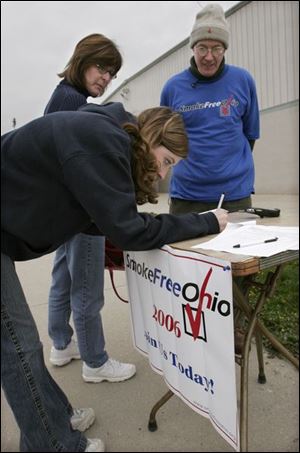
Tobacco foes aim to put smoke ban before Ohio voters
5/4/2005
Marilyn Wagoner, foreground, signs a Smoke Free Ohio petition as her mother waits. Manning the table outside the Lucas County Recreation Center is Stu Kerr, Smoke Free Ohio regional volunteer coordinator.
Recent bans on smoking inside bars and restaurants in conservative states like Georgia and Montana - home of the Marlboro Man - are prompting anti-tobacco advocates in Red State Ohio to predict the tide against smoking is turning in their favor.
"The United States is reaching a tipping point, and the message is spreading. People are beginning to understand secondhand smoke is a public health hazard," said Tracy Sabetta, director of Tobacco-Free Ohio.
Her group, along with several others, launched a statewide effort yesterday to collect enough signatures to get a smoking ban on next year's ballot. More than 700 volunteers fanned out in 50 Ohio counties.
Whether a true tipping point is happening is hard to say.
However, Stephanie Wasserman, health policy analyst with the National Conference of State Legislatures, said momentum is growing to pass statewide smoking bans. By her count, 18 states have passed, or are considering, bans.
In addition to the bans in Montana, North Dakota (which exempts bars), and Georgia earlier this year, Michigan, Minnesota, Colorado, Vermont, Washington, and New Jersey are considering bans. All of those have been passed or proposed since January.
If passed, they would join earlier bans in California, Delaware, Massachusetts, and New York. Other states that have passed bans with some exceptions, such as allowing smoking in bars, include Connecticut, Utah, Florida, Maine, and Rhode Island.
Ms. Sabetta wants Ohio to be a part of the effort to ban smoking.
Her group's plan is to collect at least 96,870 signatures to get the matter before the Ohio General Assembly in January. If the legislature fails to act, or tries to amend the ban, the group would need to collect another 96,870 signatures to bypass the lawmakers and get the issue on the November, 2006, ballot.
Their proposal would ban smoking inside all public places, including bars, restaurants, and even private clubs that pay their employees.
Most legislators in the Republican-dominated General Assembly have resisted calls for a statewide smoking ban, but they might want to heed the advice of Montana Republican Don Roberts, who helped sponsor the smoking ban there.
Citizen initiatives "are not vetted like bills are," he said, meaning if legislators fail to act, they don't have a say in the debate over what sort of smoking ban could be implemented. He said that fear, along with a growing recognition of the health effects of secondhand smoke, prompted legislators in Montana to push through a compromise no-smoking bill.
Mr. Roberts, who is an oral surgeon, said legislators worried that if Montana cities started passing no-smoking bills, it would put bars and casinos in those cities at an unfair disadvantage to cities without bans. So, a statewide ban was passed with the compromise being it won't extend to bars until 2009.
Ms. Wasserman said money may have more to do with the momentum than health concerns. Bans limit exposure to tobacco smoke as well as encourage smokers to quit, she pointed out.
"A lot of states are looking at the cost of their Medicaid expenditures, which are a huge cost and huge part of state budgets, and so states look at the burden of tobacco-related illness, which on average is about 14.4 percent of state health-care expenditures," she said. "And I think frequently [legislators] say, 'If it can happen in one state, maybe it's an opportunity for us to explore.'●"
Jacob Evans, a lobbyist for the Ohio Licensed Beverage Association, scoffs at the idea that momentum is growing in states to pass bans, pointing out most states haven't gone that route.
His group adamantly opposes a statewide ban, arguing it would hurt bar business. He said his group "is certainly concerned" that Ms. Sabetta's group may be successful in getting the issue before voters. He said his association will counter with its own effort, but declined to say what form that opposition would take.
Cassandra Welch, director of national advocacy for the American Lung Association, argues those like Mr. Evans are on the losing side of the issue.
"This is a trend, both at the local and statewide level. It's across the country and not just on the coasts anymore," she said. "It's really starting to catch on, and I predict by 2010 most communities in the U.S. will be smoke-free."
Contact Luke Shockman at:
lshockman@theblade.com
or 419-724-6084.